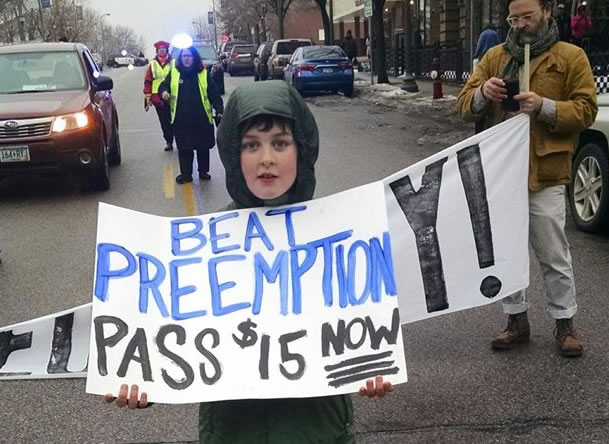

Share
Community groups, labor unions and the movement for a $15 minimum wage are ramping up efforts against state legislation that would take away cities’ power to pass their own laws. Preemption bills appear headed to final votes in both the Minnesota House and Senate.
The legislation, SF580/HF600, would restrict local governments from establishing higher employment standards – like earned sick time, fair scheduling and minimum wage – within their boundaries. Additionally, it would strike down any such ordinances passed after Jan. 1, 2016, nulling historic victories on earned sick and safe time in Minneapolis and St. Paul.
The House Ways and Means Committee holds a hearing on HF600 Monday, Feb. 27, likely the last stop before going to the floor of the House. Companion legislation in the Senate is on a similar track.
15Now Minnesota and Neighborhoods Organizing for Change, groups leading the effort for a $15 minimum wage in Minneapolis, will rally at 5 p.m. Monday at Peavey Plaza, 1111 Nicollet Mall, Minneapolis.
“As [President Donald] Trump attacks sanctuary cities, Muslims, refugees, immigrants, and our already over-policed communities, state legislators are rushing to take away cities’ power to pass our own laws to become sanctuary cities or raise the minimum wage,” organizers said in announcing the event on Facebook.
“We need Minneapolis to take a bold stand to protect our communities by expanding sanctuary protections for immigrants and refugees and passing a $15 minimum wage for all workers.”
The Minnesota AFL-CIO and affiliates have launched online campaigns urging union members to contact legislators.
“Corporate special interests are pushing a bill that would take away local control to raise the minimum wage, enact earned sick time, and improve any labor standard,” the federation states.
“This attack on local control would eliminate paid sick time for more than 150,000 working Minnesotans. Make no mistake, this is corporate interference by the state’s most powerful industries and a threat to local democracy.
“Please tell your legislators to oppose this attempt at corporate interference.”
Proponents say preemption legislation is necessary to stop “a patchwork of local labor and employment ordinances” that would be confusing and expensive for businesses to navigate.
Opponents counter that the law is extremely broad and would prohibit local governments from enacting worker protections in areas, such as earned sick and safe time, where the state government has not acted.
If passed by the Legislature, the preemption measure is likely to be vetoed by Governor Mark Dayton. However, the House bill contains two provisions intended to appeal to the governor: Money to fund the state Public Employment Relations Board and funding to beef up enforcement against wage theft.

